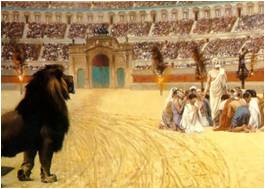 First and Second Peter are grouped in what are called the General Epistles, written to the Church at large. The theme of First Peter is the refining and growth potential in our sufferings, 1Pe 1:3, 1Pe 1:6; 1Pe 2:2. This epistle was written to believers scattered by persecution throughout Asia Minor (1 Pe 1:1). The date was circa 64-65 A.D.—the beginning of Nero’s persecutions. First Peter is the best known and loved of these epistles, called by E.J. Goodspeed, “One of the most moving pieces of persecution literature.” This epistle is written to suffering believers, and is styled by Isaac Walton as, “affectionate, loving, lowly, and humble.” This epistle conveys an intense expectation of the Lord’s return as seen in 1Pe 1:5, 1Pe 1:7, 1Pe 1:13, 1Pe 2:12, 1Pe 4:13, 1Pe 4:17, 1Pe 5:1, 1Pe 5:4.
First and Second Peter are grouped in what are called the General Epistles, written to the Church at large. The theme of First Peter is the refining and growth potential in our sufferings, 1Pe 1:3, 1Pe 1:6; 1Pe 2:2. This epistle was written to believers scattered by persecution throughout Asia Minor (1 Pe 1:1). The date was circa 64-65 A.D.—the beginning of Nero’s persecutions. First Peter is the best known and loved of these epistles, called by E.J. Goodspeed, “One of the most moving pieces of persecution literature.” This epistle is written to suffering believers, and is styled by Isaac Walton as, “affectionate, loving, lowly, and humble.” This epistle conveys an intense expectation of the Lord’s return as seen in 1Pe 1:5, 1Pe 1:7, 1Pe 1:13, 1Pe 2:12, 1Pe 4:13, 1Pe 4:17, 1Pe 5:1, 1Pe 5:4.
Gene Cunningham - June 9, 2000
Life of Moses #2
Scripture References: John 2:11, Psalms 91:1-2, Hebrews 3:5, Hebrews 11:24-26, Psalms 91:1-16, Deuteronomy 18:15, Hebrews 11:23, Psalms 90:1-17, Lamentations 3:23-24, Exodus 2:15-20, Hebrews 11:29, Psalms 90:12, Exodus 2:12, Hebrews 11:27-28, Hebrews 6:19, Exodus 3:1-6, Acts 7:35, Psalms 91:9, Numbers 12:7
From Series: "Life of Moses"
After 40 years in the Egyptian palace then 40 years in the desert then 40 years leading Israel to their land Moses' life can actually teach us about living in the time we live.

